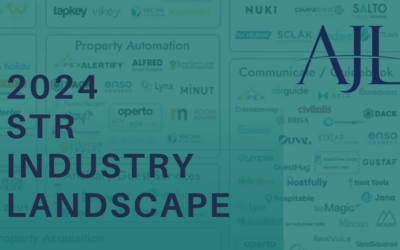In a recent interview, Brian Chesky, the CEO of Airbnb said the company needed millions of additional properties to meet guest demand. In parallel, many property management companies in the vacation rental industry are focusing effort and resources on growth to prepare for the aftermath of the pandemic.
Even if growth is one of the top priorities for property managers, this can also put your business at risk if you don’t plan correctly or if the execution of your growth strategy is not right.
Some of you might remember the fate of Hostmaker and Stay Alfred who, despite important investments on the promise of scaling infinitely, weren’t able to survive and went bankrupt.
Based on 30 years working across the industry, we’ve seen how some common approaches to scaling a short term rental business are simply unsustainable—and put an entire business at risk.
For those of you looking to scale your own business, it’s time for a quick recap on the dos and don’ts based on what we’ve seen working within the industry.
Some of the pitfalls companies fall into include:
– Trying to grow into different markets simultaneously
– Expanding from an urban to a leisure destination
– Underestimating how local dynamics affect the acquisition of new property owners
– Not having enough human resources to absorb the additional workload
Across different business models, one thing most of the successful scale-ups in our industry have in common is their capacity to plan and execute a growth strategy adapted to their financial and operational capabilities.
In this article, we’ll dive into the key aspects to consider when scaling and show you how to plan and execute your growth strategy, and which tools to use to give your business the greatest chance of success.
Scaling different types of vacation rental business models
Before we talk about how to scale, it makes sense to cover the risks and difficulties associated with scaling different vacation rental business models. One way to assess where a business struggles is by conducting an audit for your vacation rental business.
Full-service vacation rental management
This business model is potentially one of the hardest to scale as it requires a physical presence to operate a portfolio of properties and requires a large team at every destination. Scaling is also complicated by the difficulty posed by trying to replicate a network and local know-how outside of your historical market.
Additionally, if your model is a lease arbitrage (or master lease, where you pay fixed rent to the owner and not a share of the booking revenue) the risk of having so much debt on your balance sheet is also high, especially as interest rates are rising.
Vacation rental online property management
This model is mostly digital so it’s easier to scale than full-service as you won’t require a physical presence in every destination. Property owners will take care of the operational aspects attached to a booking.
To make this model work, you need to rely on robust tech and the quality of services provided by owners.
A great example of scaling this model is Homerez, which manages 11000 properties across Europe from their Paris headquarters. Since the business is not directly involved in operating the properties, they’ve been able to scale with a small team—just 35 people, according to LinkedIn.
To put this in perspective, that’s an average of 314 properties per employee when the average for full-service property managers is 10 properties per employee, according to Transparent.
Related post: What is Vacation Rental Revenue Management? Detailed Guide
Franchise model
Increasingly popular, the franchise model is perhaps the best position to scale for full-service property management businesses.
Franchises provide centralized branding, efficiencies, know-how, along with clear systems and processes. The franchisee will be the “boots on the ground” and build the local operations under the expert guidance of the franchise.
This provides aspiring vacation rentals entrepreneurs with education and a transfer of knowledge while enabling them to focus more time on guest experience and courting new owners to join their portfolio.
Hybrid models
Why choose between one or the other when you can take advantage of the best aspects of all the approaches outlined above?
Too often, we see businesses so focused on scaling things “their way” that they leave opportunities untouched. For instance, there’s no reason why a full-service property management business shouldn’t also expand into online property management.
You’ve probably already generated leads of owners based in a destination where you aren’t present—this opportunity would be wasted without a hybrid approach.
Adopting a hybrid model enables you to address more opportunities, as compared to the investment of opening a new office, providing online property management to a new owner in a distant location will only add marginal costs.
When is the right time to scale your rental property business?
For vacation rental businesses looking to scale, it’s paramount to consider the readiness of your organization, systems, processes, and finances.
As a business owner, you want to avoid executing your growth strategy only to hit a massive, unforeseen roadblock to scaling when you’ve already built your business around a certain model. Scaling requires a lot of effort, both in terms of focus and financial capabilities.
Consider the following factors as a priority before expanding your operations:
– Human resources
– Technology and automation
– Quality management
– Financing capabilities
– Path to profitability
For example, if you manage 100 properties and already experience quality issues or aren’t able to recruit and retain staff, trying to add another 100 units to your portfolio before solving this issue won’t work.
This will create a snowball effect, damaging your reputation with guests and owners. Both aspects can and will prevent you from scaling further and are likely to produce the opposite effect as your churn rate will increase.
These issues will also be much harder to solve as work volume increases. You and your team will be stuck firefighting issues to the point that you’re unable to grow or improve the business. This will in turn affect morale and become another obstacle to overcome on top of executing your growth strategy.
You need to consider these factors carefully and take steps to address them. Only then are you in a position to scale.
10 Tips to scale a rental property business
1. Build a foundation that can support scaling
If you want to scale your vacation rental business, you need to build a solid foundation that will support the scale you expect to reach. The more your vacation rental business grows, the more processes need to be documented, automated, and optimized—the more technology will become the backbone of your organization.
For example, if your current PMS is clunky or doesn’t offer any options to automate, you’ll be better off switching to another provider before taking on more work.
To identify what you need to do before scaling, you need to perform an in-depth SWOT analysis. You need to have a candid vision of the Strengths, Weaknesses, Opportunities, and Threats of your business to build the right plan.
A mistake a lot of businesses make is narrowly focussing on the opportunities they can see for growth and neglecting to consider the strength and weaknesses of their business, and what threatens to derail that growth if it isn’t addressed.
When done properly, the SWOT analysis will enable you to understand what you need to improve before you start scaling and position your business for growth.
2. A plan is only as good as its execution
What is the purpose of a plan that can’t be executed?
Although we understand that ambitious objectives might be a driver for many entrepreneurs, it’s crucial to understand the capacity of your organization in executing any growth plan.
If what’s drawn on your whiteboard looks more like science-fiction than something tangible, this plan won’t serve its purpose.
You must consider the capacity of your team, the human resources requirement of your business as it grows, and how scalable your processes are.
3. Hire a consultant
Aspirations and experience are two very different things. If you’ve never scaled a business or run a large organization, you’ll definitely miss some key aspects and make mistakes.
Related Post: 8 Best Vacation Rental Consultants For Your Business Growth
We always ask new clients to perform a detailed SWOT analysis of their business before we make a plan and, most of the time, our clients overlook the Threats and Weaknesses sections entirely, instead focussing more on their perceived Strengths and Opportunities.
An external set of expert eyes will help you fill in those gaps, understand what the preliminary work you need to deliver is before starting to scale.
This way you can build a plan aligned with the capacity of your business, with clear milestones and KPIs for you to track success, and adjust as you grow.
Looking to grow your short term rental business to scale new heights? AJL Atelier is your go-to partner for helping you scale based on decades of experience specializing in the short term rental industry.
4. Consider unit density and geographical footprint
A common mistake we’ve seen with full-service short term rental businesses trying to scale too rapidly is that they look to spread out geographically instead of building more unit density in their core market or region.
Whether you manage 10 properties or 100, when you multiply the destinations you operate instead of optimizing the ones you are already present in, you create a huge financial burden for your business.
This will prevent you from investing further in growth and only slow you down.
On the other hand, if you grow within your core market, you’ll have a higher unit density which will translate into operational efficiencies and increased profitability. This will then enable you to finance growth in a better way and enable you to invest more into the destinations you wish to develop so they become profitable faster.
5. Ensure your tech stack is solid enough before scaling
Manual processes are costly, prone to mistakes, and not scalable.
If you want to scale your business, you have to automate where possible to limit the human resources needed for repetitive tasks, like providing the Wi-Fi code, gathering guest IDs, or charging payments.
Additionally, if you schedule cleaning and maintenance tasks manually you should think of adopting technology to do this for you. The same goes for check-in and check-out, which are costly processes you can automate.
Technology is a major pain point for many property managers we work with but getting your tech stack right is critical if you want to scale. We often help property managers select the right providers to build an integrated tech stack that will support their business as it scales and beyond.
Human resources are best deployed on things that require human intervention and clever automation will free your staff to work on quality control and finding areas to improve the business.
6. Don’t sacrifice quality for growth
A recent study by Transparent, a market intelligence tool, shows that review scores get lower as property managers take on more units.
Of course, operating 500 units is more challenging than operating 20 but larger businesses also have more resources so this excuse isn’t really valid. There are also plenty of examples of businesses that have scaled while maintaining an excellent quality of service.
It all comes back to planning and preparation. Before you grow, you need to document your processes and build standard operating procedures (SOPs). These SOPs will help your current employees maintain consistent standards and greatly streamline the training of future hires. They’re also easy to adjust and improve as you track and measure their efficiency.
We’ve witnessed first-hand the challenges posed by operations for growing businesses and working on standardization and clear processes before things get out of control is something we highly recommend.
7. Make sure you have clear objectives and a clear vision of the synergies you can create with scale
Why do you scale your business? What do you achieve with scale? These are some of the questions you need to ask yourselves during the planning phase to understand what scaling will bring your business.
The right metrics need to be clearly identified beforehand and continually measured as you grow, so you can understand what point you need to reach for more volume to really benefit your company.
Maybe you’re thinking about an exit from your business in a few years and want to increase the value of your company. In that instance, perhaps you’ve identified scaling as a means to achieving that goal.
Of course, you need to bear in mind that any buyer will look closely at your data and see if scaling actually made sense.
Indeed if you end up being less profitable after scaling or if you’ve fully managed inventory spread out across destinations with only a small number of units this might not create the upside you were expecting.
On the other hand, if you manage to build a growth machine with clear synergies, then you’ll benefit from it when exiting your business.
8. Do some research and consider all scaling opportunities
We see classical full-service property management businesses looking to scale this model across several destinations at the same time far too often.
It’s usually extremely challenging as a local presence and network were probably what enabled you to build your business in the first place.
Those aspects are very hard to replicate, and you might encounter some fundamentally different regulatory, cultural, and competitive landscapes as you move your business into new destinations.
On the other hand, we are seeing a lot of success for those who capture more opportunities by scaling in a hybrid way.
To take a concrete example, the DNA of your business might be full-service property management, where you market and operate the properties.
What prevents you from only providing the online marketing services, customer support, and payment processing services to owners who’ll then manage the operational aspects of the bookings?
Indeed you have the know-how, the technology, the human resources in your central office and you will avoid requiring operational staff on the ground.
Alternatively, if you have built the best technology, SOPs, and a relevant brand, why not resell this to others as a franchise?
The franchise model is becoming more and more present in vacation rentals and we believe that it is potentially the best way to scale and build a meaningful brand while removing the hassle of opening new destinations yourself.
9. Understand the path to profitability for your business as you plan to scale it
Scaling your business will require you to invest a lot of capital, either from your own funds, from a bank, or an investor.
Regardless of the origin of that capital, you need to clearly understand how this deployment will be recouped, how and when your growing business will become profitable.
When Vacasa published their SPAC merger documents, everyone was amazed by their losses in conjunction with their scale and questioned how it was possible to lose $50 million in a year when managing 30,000 properties.
The CEO of Vacasa explained investment in growth had laid out a clear path towards profitability once a certain scale and/or unit density in some markets is achieved. Without this investment, the business would have been profitable in the short term but wouldn’t have been able to grow.
Although you might not be looking into acquiring hundreds of competitors, raising hundreds of millions, with the goal of managing tens of thousands of units, you still need to adopt this reasoning and forecast how and when your scaling business will become profitable.
10. Have a clear vision of the financial requirements to execute your plan
As discussed above, scaling requires capital and you need to have a clear forecast of how much you need before you develop a new business model or grow into new destinations.
One aspect is understanding that any new properties you will add into a new market will potentially experience some latency until they build an online reputation to gain traction.
Make conservative estimates in order to avoid having to delay your plans because you underestimated some of the challenges along the way. It also helps to have a clear vision of the type of properties you’ll target in a new market to avoid loss-making acquisitions.
Thoroughly analyzing new destinations you wish to open will help you understand local market dynamics and how much effort you have to deploy (financially and operationally) to succeed there.
For example, if you require 25 properties in a destination to cover the cost of your operational team, and are able to add 3 properties per month, you need to be able to support at least 8 months of losses to make this plan work—even if these 25 new unites will contribute positively to your business in the long term.
Conclusion
We understand perfectly well the aspiration of entrepreneurs to build and scale their business and we have a clear understanding of the challenges you’re likely to face along the way.
Far too often we see companies entering into a very aggressive growth strategy without the proper assessment and planning. It’s common to encounter people in this industry who simply think growth at all costs is a prudent strategy. Having run and collaborated with thousands of short term rental businesses as they’ve scaled, we’ve got a clear understanding of what works and what doesn’t.
This is why we believe that such an initiative has to be clearly planned and that sometimes additional help is required to fill in the gaps in your organization.
Having access to external and expert resources to help you identify, validate, improve, and discard ideas will only help you in achieving your goal faster and more profitably.
Looking to grow your short term rental business to scale new heights? AJL Atelier is your go-to partner for helping you scale based on decades of experience specializing in the short term rental industry.



